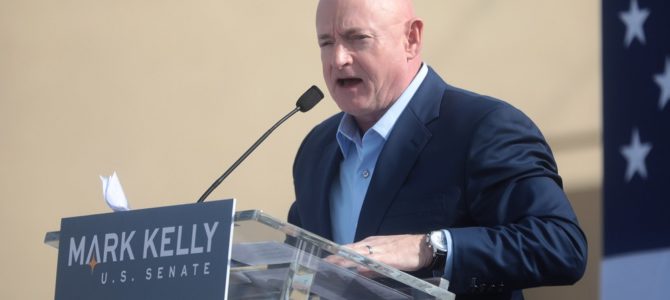
It’s no secret that Democratic Arizona Senate candidate Mark Kelly has a long history of business dealings with companies with strong ties to the Chinese Communist Party. But a new report details just how far back those relationships go.
According to the Washington Free Beacon, in 2003 “Kelly attended the annual Young Leaders Forum, a five-day junket co-hosted by the Chinese People’s Institute of Foreign Affairs, which is ‘under the leadership of the Communist Party of China.’” Kelly was personally invited to the conference by the Chinese government, with all expenses to the exotic retreat paid for.
The prestigious conference provided Kelly the opportunity to associate with high-level CCP officials and rising stars in Chinese society. Some of the attendees at the event included “Cui Tiankai, now Chinese ambassador to the United States; Fang Xinghai, former director of the CCP’s top committee on the economy; and Zhou Mingwei, the party’s former top foreign propaganda honcho.”
Kelly went on to attend the conference again in 2004 and 2005, calling the experience “one of the absolute highlights of my life, second only to flying in space.” When pressed on whether Kelly used any of the contacts he met on the YLF trip for business ventures, a Kelly spokesman deflected, instead stating his involvement was “coordinated by NASA.”
Ouch! Three Astronauts Endorse AZ's GOP Senator Over Her Astronaut Senate Challenger
https://t.co/xFDcONhL0Y— RedState (@RedState) October 4, 2020
Kelly’s lucrative business ties with the CCP have come under heavy fire following a RealClearPolitics (RCP) report that found that World View Enterprises, a Tucson-based company co-founded by Kelly, has received massive investments from Chinese state-owned technology corporations.
In fall 2014, the company announced that it had received an undisclosed investment sum from Tencent Holdings Ltd., the same tech giant that suspended streaming of NBA games last year following a league general manager voicing support for the Hong Kong protestors. In April 2016, World View received additional investment funds from Tencent, “as part of a subsequent, $15 million investment round.”
Originally created as a “space tourism start-up with plans to charge $75,000 per passenger on flights to near outer-space,” World View has shifted focus towards attaining contracts with the U.S. government. In addition to co-founding the firm, Kelly served as an advisor prior to launching his bid for the Senate.
The former astronaut still holds financial interests in the company, with “$100,000 to $250,000 worth of non-public stock and $15,001 and $50,000 worth of stock options,” according to financial disclosure records Kelly filed. The Kelly campaign also received a $5,000 campaign donation from David Wallerstein, Tencent’s chief exploration officer, whose main responsibilities include expanding the “company’s operations outside mainland China” as well as “overseeing business initiatives with multinational partners.”
World View has attempted to downplay the significance of the revelations, stating that Tencent’s level of investment “came from Tencent subsidiary Mount McKinley, ‘an early investor,’ which now maintains ‘less than 5% in common stock.’” The company spokeswoman later went on to say, “They do not have a seat on the board, means of control, or any access to inside information about the company or its technology.” However, after World View referred to McKinley on the exact amount of money received from Tencent, McKinley declined to comment on the matter.
These China-related developments are sure to continue to play a big role in the Arizona Senate race, where Kelly holds a steady lead over his Republican opponent, Martha McSally. According to the RCP average, Kelly holds a 5.2 percent lead over the incumbent. However, a recent ABC News/Washington Post poll shows the gap may be closing, with Kelly only leading McSally by 1 percent among likely voters (49 to 48 percent).
The highly contested battle for the Grand Canyon State will play a critical role in determining which party ultimately obtains control of the U.S. Senate come November. If Republicans hope to hold on to their majority, they need to make winning Arizona a priority.
With other Republican incumbents facing tough reelection bids in Maine, North Carolina, and Colorado, Republicans can’t afford to lose this once reliably red state. Doing so would certainly put Democrats in a position to reclaim the upper chamber.
Kelly’s China corruption coupled with the upcoming Supreme Court battle could be enough to push McSally over the finish line. However, that remains dependent on how badly McSally wants to win. She can’t play the same game she did in 2018 if she wants to win this time around.
Likeability remains a big part of McSally’s problem, which means she’s going to have to do better at personally connecting with voters, as well as lessen the credibility of her opponent. If McSally can manage to paint herself as a pro-American China hardliner, while demonstrating a more empathetic appeal to likely voters, she may just make it across the finish line.









